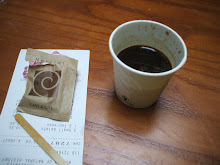The need to wipe our bums is certainly nothing new. Though I know our contemporary diet is full of additives and alternatives that humans did not consume hundreds and thousands of years ago, I feel reasonably confident in assuming that my progenitors’ poop was not remarkably less messy than my own. And I feel reasonably confident in guessing that my solution—maple leaves—this morning when the need for a porcelain basin came inpropitiously while I was in the woods was not so different from what men and women must have chosen to use in centuries past.
A bit of research into the development of this remarkable modern convenience turns up the fact that the Koran dictates the use of the left hand for cleaning up afterwards. This is, of course, a rule that must seem barbaric by our “Western” standards of hyper-hygienic, anti-bacterial obsessiveness. No wonder, some might even say, that we consider Arabs so backwards and primitive; of course anyone who actually touches his own feces must be little better than an animal. And our civilization is obsessed with nothing so much as separating ourselves from animals—and anything that smacks of the natural world. How inconvenient then that we must be faced with the fact of our animal-ness whenever we sit down to take a crap.
But what is wrong with shells and corn cobs? Or my morning choice of the maple leaf? Why supplant these with hundreds of feet of rolled, quilted, double and triple ply, bleached paper? Certainly the coastal dwellers in Hawai’i and elsewhere who have relied on mussel and scallop shells learned which shells were most efficient and felt the best on their tender-skinned bottoms. Consider this picture: a woman picking along the beach for the perfect shells for her family to use in cleaning themselves, the quilted scallop or the double-ply mussel or perhaps the rough efficiency of the clam, much as the vaunted shopping wife of contemporary culture wanders down the aisle of the grocery store deciding which package of twenty-four rolls will best serve her family’s needs. Yet the “Indian”—for isn’t every brown-skinned person of non-Western descent still an Indian (read “savage”) still?—chooses the item that can be washed after each use and reused, much like the Arab’s hand. I wonder, given our societal obsession with convenience and single-use items, whether our Pilgrim progenitors saw fit to reuse their corncobs, the mere mention of which makes me wonder if their stereotypical uptightness didn’t result from a continuous case of hemorrhoids.
But I am no better than that which I tease here. When traveling in Europe and Asia and South America before our mania for comfortable convenience began to spill inexorably over into other places, I often looked forward to returning to the States for at least this reason: my bum was sore from the use of the rough sheets that passed for toilet paper in those places. I wanted my quilted softness, my plys, my rolls that I could pull a whole wad off of for one single wipe, and then another roll, and another, until the bowl was filled with paper. It is certainly one way we can hold ourselves above other so-called civilized societies. Where they haven’t gotten beyond the 1880 introduction of toilet squares by the British Paper Corporation, we invented the roll in 1907. And life has only gotten softer and more convenient since. Never again will anyone have to rely on maple leaves, though I must admit: they were softer than your average roll of Scott tissue.
Friday, September 07, 2007
writing from 2004
Dug this up from some of my random, fun writings a few years ago...

